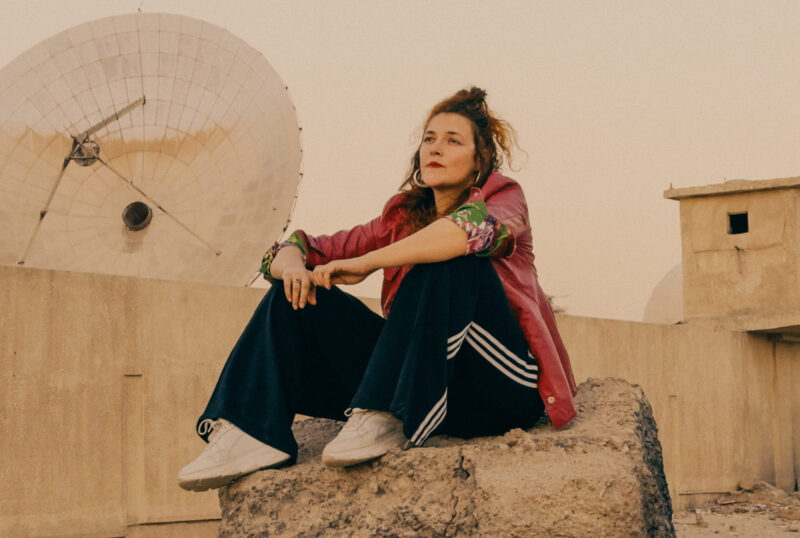Jamila Al-Yousef joins me from her temporary home in New York on a sunny morning – she is in town for her upcoming fundraising concerts. With the sounds of breakfast drifting in, we slowly ease into a conversation about “LAYLA (ليلة)”, the latest song released by Jamila and her band Jamila & The Other Heroes.
Öykü Naz Gümüş: The song “LAYLA” seems to have traveled across borders. It emerged in Jordan, then you took it with you to Palestine, and finished it in Germany. Can you take us back to where it all began?
Jamila Al-Yousef: Most of my ideas come to me in the bathroom. On March 23 last year, I went to a jam session in Corner’s Pub in Amman, and during a bathroom break, I hummed this melody. Half a year later, when I was in Palestine on October 23, the melody was still stuck with me. A friend, Amr, played chords to it during jamming, and we played around with it. It was that evening, right after October 7, 2023, we gathered with some friends in Ramallah, because we were all deeply affected by the news, and we wanted to feel less alone with it. While we were jamming, a rocket flew above our heads.
When I got back to Germany, I tried to process all the emotions I felt, leaving Palestine and my family and friends behind, and I started working on the song with my band. Actually, I should add one more country to the list. I wrote a big part of the lyrics in Montenegro, near the sea, during a retreat with activists from around the world. Six of us were Palestinian. It was Nakba Day. We had prepared a whole program for everyone there who didn’t know much about Palestine, which was so special and moving. I wrote the verses and the bridge in Montenegro. So yeah, I took the song to different places.
How has the distance between these places impacted the way the song evolved?
I would rather say it was less about the actual distance between the places and more about the different proximities, like being close or far from home, or being close or far from violence, that impacted the song. In Palestine, I was on my family’s home soil, then I returned to violent Germany, then visited a place where I could actually breathe – Montenegro, a breath away from Germany again. All of that influenced the song.
اجتمعنا بآخر الليل
عشان ما بنقدر ننام والناس عم بموتو
بنحزن و بنحضن بعض بقوة
بنغني طول الليل
هيك بنقاومwe came together late at night
coz we can’t sleep while people die
we grieve and hold each other tight
singing songs all night, coz this is how we fight
– Jamila & The Other Heroes “LAYLA (ليلة)”
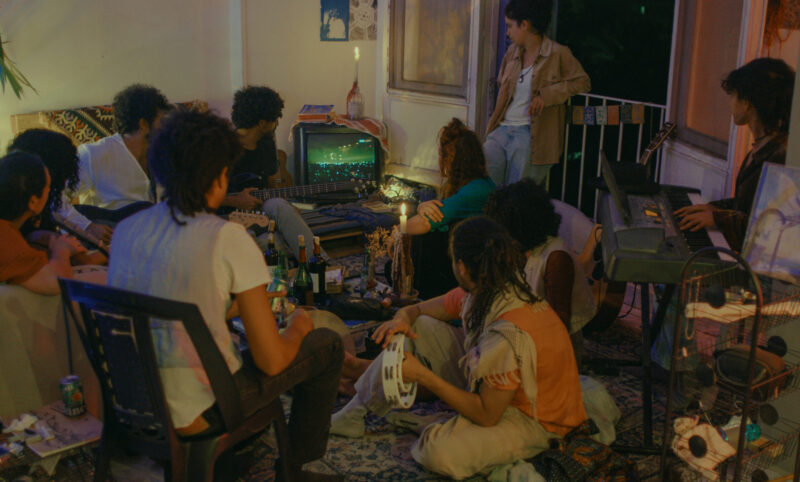
Meditations on Home
You also mentioned feeling disconnected after returning to Germany. For someone who creates between worlds – one where life moves forward and another where pain and trauma persist – what does “home” feel like?
Home is many things. Let me breathe a moment on that… I think there is a difference between a physical and emotional home. My emotional home is very free and independent from all the physical places. I feel a big part of home in Palestine, as well as in Jordan, because since I was a child, we used to visit family, who were displaced from Palestine, in Amman.Then I also feel at home in Berlin. A large part of who I am was shaped in Berlin and in the small town in northern Germany where I grew up. But at the same time, I always felt like a stranger or alienated there. So “home” doesn’t really fit. Sometimes I feel more at home, for example, in a song. Playing that song again and again is like coming home in a way, right?
When I play certain songs with my band and feel that people in the audience can relate to them in the live moment, I think that is a moment of ultimate home.
Your music confronts painful themes – grief, displacement, survival. When writing about such struggles, how do you honor those stories in solidarity without turning pain into exploitation?
I make sure to never speak on behalf of others and to not go somewhere, take what I need for my project and fuck off. For the music video of “LAYLA”, for example, we met with a displaced family from Gaza living in Cairo. They invited us for lunch, and we asked for their consent to film parts of that. To this day, we are still in touch, and I recently did a solidarity concert and donated half of the income to the family, so they could send the money to their daughter, who’s still in Gaza with her grandparents. They barely have anything to eat. And when the mother needed medical care, I reached out to everyone I knew in Berlin to raise money for the surgery.
A Collective Work
How did the idea for the music video come to life?
Over the summer, I told my friend Melih about the song. He had already wanted to shoot a video for us, and we knew we wanted to film somewhere outside Germany. Later, I booked a flight to Egypt. When I told him, he said, “Ah, yeah, cool, then I’ll book my flight too.”
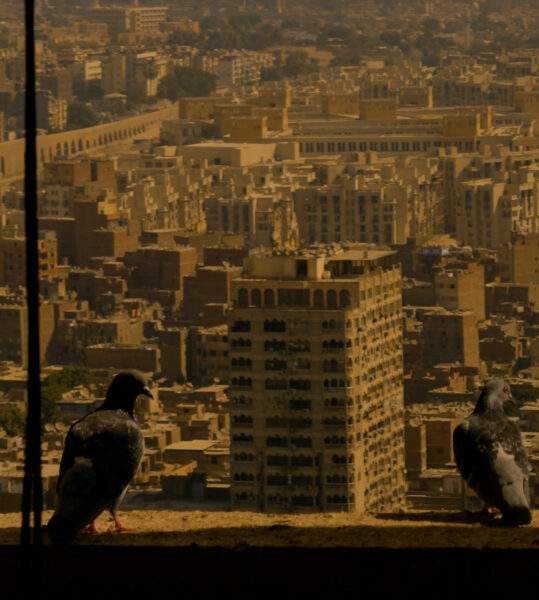
It was all very spontaneous. We started shooting the first scene at these satellite dishes in Cairo, which became symbolic for me. They are a symbol of waiting for a sign, trying to communicate, being far away, but still wanting to stay connected. Within five days and nights, we shot the whole music video and barely slept all week.
Luckily, I also had so many beautiful musician friends there. We kept jamming every other night, and that’s when we thought of recreating the jam session scene from Ramallah, which is part of the song’s story. It was produced professionally, but still, there was this factor of spontaneity. We barely slept all week. So many people offered their homes for filming and supported us along the way – it was a very collective work.
Was there a moment that especially moved you during the shooting?
Definitely, it was meeting the family I just mentioned. Their story is heartbreaking. They left Gaza on September 23 – a month before the genocide started – because their son needed an organ transplant. They went to Cairo for the surgery, but their son died. Then the genocide started, and they couldn’t go back. But they had left their four-year-old daughter in Gaza.
When the father told me this, I had to try so hard not to burst into tears, because I felt like this is unimaginable. At the same time, I was amazed by the intense energy of life they radiated. They were still smiling. You can see in our video that his wife created the most amazing Palestinian food that looks like an incredible artwork itself. What beauty in the simplest things. To share all that with us, their food, even when they have so little. Melih Akya, the DP, told me that when he met them in September, they didn’t even have mattresses to sleep on. Their story and their resilience are powerful. It’s so interesting how close pain and resilience are.
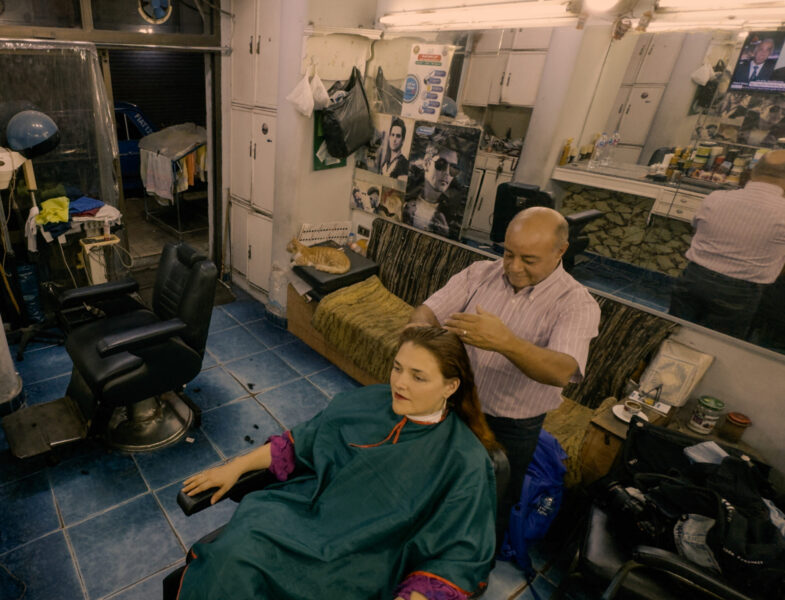
Yalla, Let’s Go
You’ve dedicated this track to the global Palestinian family living on the land in Palestine and in the diaspora. If someone listened to “LAYLA” without knowing the lyrics, what feeling do you hope they walk away with?
The song has different energies. It starts melancholic, then the band comes in, and you feel the power of being alive. The verses and the bridges bring back sadness, but also say, “Yalla, let’s go.” Within all the grief, powerlessness, and the incredible anger about the injustice, these parts are about regaining power. We even had four string players from Staatskapelle Berlin contributing to the recording for free because they genuinely believed in the message. In the last part, we sing: “We will never give up. We’re here, we’re alive, we’re fighting.” So, I hope maybe if someone listens to it without knowing anything about the song, they still get the sense of this. 
Sometimes people wonder how we can talk about such hard things and make joyful music. Joy is really important to feel alive and to maintain resistance and resilience. Joyful music about painful things helps us survive.
Making a Documentary
You and Melih Akya are currently working on a documentary about displaced artists. Can you tell us a bit about it?
I wouldn’t say I’m leading the project. I’m supporting Melih’s work. Yes, we started interviewing displaced artists in Cairo, many of whom were part of the Gaza music scene. One of them, Ahmed Saqer, who used to run music festivals and education programs in Gaza, and who has led the collective Palestine Music Expo in Gaza since 2018, is now running the programs in Cairo. About thirty musicians are creating, jamming, attending masterclasses, and doing music therapy. We also interviewed two war photojournalists from Gaza, and Melih already has a lot of footage from the Palestinian resistance scene in Berlin, as well as connections to the Palestinian community in South Africa. He wants to make a documentary portraying all these different voices. I made the questionnaire for the interviews and conducted the interviews. We’re co-creating and ping-ponging ideas back and forth.
Do you see parallels between documentary filmmaking and your songwriting process?
I think what’s similar is going into it with a big, open, empathetic heart. The interviews we did needed so much sensitivity and care – that’s something I also recognize from songwriting. My songwriting often comes from improvisation. And I feel like making interviews and documentaries work the same way for me. I really have to go with the flow. I have to sense whether someone feels comfortable with questions, or if new things emerge. So, I have a structure of things I want to ask, but I always stay flexible within that stream. I think improvisation is an important part of that.
Then comes the part that’s like songwriting. You have to decide on what you choose. You choose which expressions are most powerful. The final documentary might be ninety minutes at most, but the interviews often last longer than that. In the end, it’s a painful task to choose. It is important to be aware of the power you have in deciding what gets platformed and what doesn’t. That is a big responsibility. You need to think about the socio-political message and which narratives might be underrepresented. In the decision-making process, we made sure to include the people we interviewed. Collaboration is super important in documentary filmmaking and in songwriting.

Thank you so much for the heartfelt conversation, Jamila. To round out the interview, what is something that currently moves you or something that is currently on your mind?
I’m currently in the USA, playing shows to raise funds for the Palestine Music Expo. Yesterday, I was talking with Khaled Jarrar, a famous Palestinian artist living here now, and we were asking ourselves: What is Palestine besides the soil, beside the land of our ancestors? We’re more Palestinians in the diaspora now than on the land itself. And yet, across generations, people still say, “I’m Palestinian,” not “I’m German.” That’s something I find really powerful – I can choose to focus on the pain of loss, simultaneously, I can choose to focus on the beauty of the community, no matter where it is. I’m currently exploring this feeling, and I think the new music I want to write will be about that. Maybe even something like a Palestinian futurism, inspired by Afrofuturism.
What are our visions for a shared future? On this earth, in fantasy, even in space?
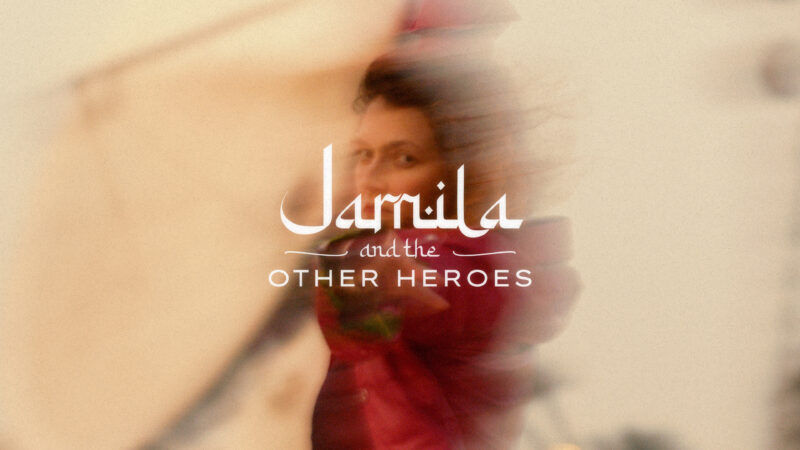
“LAYLA (ليلة)” is out via SPRINGSTOFF Records. You can stay up to date with Jamila & The Other Heroes via Instagram or their website.



